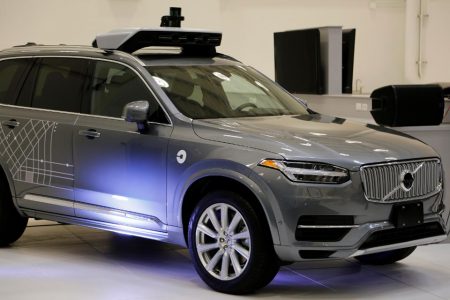November 24, 2017 – In the last week Uber Technologies Inc., the often controversial on-demand company that operates in cities across the globe, has signed a purchase order for 24,000 Volvo XC90 SUVs to be delivered between 2019 and 2021. This follows a Pittsburgh self-driving test involving 100 XC90s launched last year. This new purchase order will be for vehicles operating without drivers and will contain not only Volvo’s own autonomous technology but proprietary Uber software and sensors.
Today Uber over its 6 years in existence has grown from offering an on-demand riding service on the streets of San Francisco to over 2 million drivers in 616 cities and 77 countries providing on-demand services for 10 million riders daily. Uber’s appearance in cities has disrupted traditional on-demand providers like the taxicab industry. And in some cases Uber has even become a primary transit provider in smaller urban centres where the cost of operating public transit is deemed prohibitive.
Uber has chosen Volvo to propel it into the next phase of its operation, moving it from an arms-length driving service to a fleet operator of driverless vehicles. This is seen as a disruptive change to the entire on-demand market. States Jeff Miller, Uber’s head of auto alliances, “This new agreement puts us on a path toward mass-produced, self-driving vehicles at scale.” It also puts Uber on the path to become an autonomous vehicle fleet operator.
Uber’s Advanced Technology Group operates in three cities: Pittsburgh, San Francisco, and Toronto. It hasn’t put a timeframe on when the autonomous technology will be deployed on a significant scale, but there is no doubt that this is the direction the company is going.
Uber’s success has spawned competitors of which Lyft Inc. represents the current challenger for leadership in the on-demand riding service market. Lyft is charting a parallel course by working with autonomous vehicle new players as well as traditional manufacturers. Its partners in the former category include Waymo, the Alphabet autonomous vehicle company spin-off, Delphi Automotive, and nuTonomy. And in the latter category, Ford, and Jaguar Land Rover.
It’s fair to say that Uber’s latest move, and expected similar moves by Lyft and its partners, will represent the beginning of a disruptive change to cities where fleets of autonomous vehicles will vie with owner-operated cars on streets, and eventually supplant them. And it won’t stop there because the implications of autonomous, on-demand vehicles go well beyond who owns cars and trucks in the future.
Our North American economy owes much of what it is today to the automotive industry, from manufacturers to distributors, to resellers. And when the focus of the business is no longer an individual purchaser of a single vehicle, the implications to the economy become far-ranging, beyond the manufacturers, impacting real estate, urban development, insurance, law enforcement, the legal profession, retail, automotive maintenance and repair, and more.
So much of our urban landscape today is dedicated to cars whether parking them in garages, or on driveways or in expansive lots. With the arrival of on-demand autonomous vehicles so much of this real estate devoted to vehicles not moving around disappears. And the revenue derived from this use of real estate also vanishes.
On-demand autonomous vehicles will change how we design homes. It will change land use. With no need for driveways and garages, the footprint for homes in cities will be dramatically altered with smaller lots and no dedicated vehicle space. Commercial real estate will equally be impacted. Think of suburban malls with all of those vast hectares devoted to parking. It all will vanish.
And what happens to police when speeding and parking violations are no longer a revenue source? Or when drunk driving and other traffic violations decline to a point where we won’t need as many police?
For the insurance industry, autonomous vehicles that are fleet-owned and operated will mean a significant change as well. It impacts how policies will be designed and who will be the customer. Insuring cars may no longer be much of a business. And neither will accident claims as human error gets eliminated from the driving equation.
For personal injury lawyers whose business is heavily invested in automobile claims, there isn’t much of a future. What are the implications? Just in the United States alone, that means 76,000 lawyers representing 6% of the profession, will find themselves with very little work. The courts will be unburdened as automobile injury cases disappear from the dockets and trial schedules. For the courts that will mean fewer judges, fewer stenographers, fewer bailiffs, etc.
What will intercity road travel be like as autonomous vehicles take over? Will we need motels and hotels at highway exits if driver fatigue is no longer a constraint on the distance people can travel? What will a car even look like when full autonomy takes over? Will these be traveling living rooms or dens rather than what we know as vehicles today?
And then there is the disruption to vehicle repair shops. Collision repair will no longer be viable as a business. What that means for replacement parts providers who will also feel the disruption remains yet to be evaluated.
And note we haven’t even talked about the implications for petroleum producers, pipelines, tanker fleets, and refiners.
So this Uber purchase order for 24,000 Volvo SUVs is much more than one isolated transaction. It’s a big deal, the beginning of an enormous and disruptive change.









